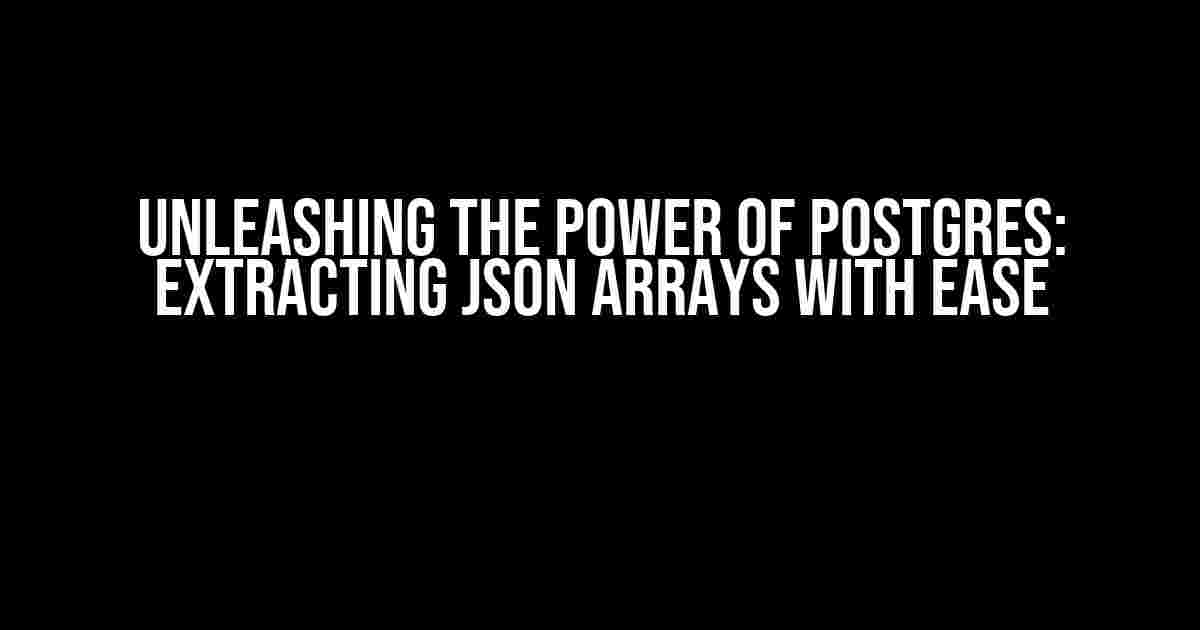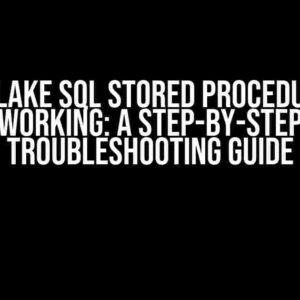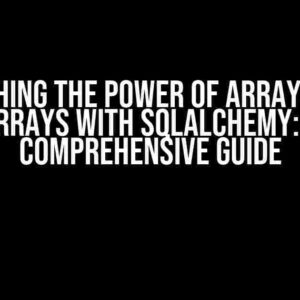Are you tired of wrestling with your data, trying to extract those pesky JSON arrays from your Postgres database? Well, buckle up, folks! Today, we’re diving into the world of JSON array extraction in Postgres, and by the end of this article, you’ll be a master of it.
- What are JSON Arrays, and Why Do We Need to Extract Them?
- Preparation is Key: Setting Up Your Postgres Environment
- Method 1: Using the `jsonb_each` Function
- Method 2: Using the `jsonb_array_elements` Function
- Method 3: Using the `jsonb_agg` Function
- Filtering and Conditionals: Extracting Specific Values
- Conclusion
What are JSON Arrays, and Why Do We Need to Extract Them?
JSON (JavaScript Object Notation) arrays are a type of data structure used to store collections of data in a format that’s easily readable by humans and machines alike. In Postgres, you can store JSON data in columns using the `json` or `jsonb` data types. But, when you need to work with individual elements within those arrays, things can get tricky.
Imagine you’re a data analyst tasked with extracting a list of user IDs from a JSON array stored in a Postgres table. You need to fetch only the IDs that belong to a specific role, say, “admin”. Without the right tools and techniques, you’d be stuck with a sea of curly braces and brackets. That’s where extracting JSON arrays in Postgres comes in!
Preparation is Key: Setting Up Your Postgres Environment
Before we dive into the nitty-gritty of extracting JSON arrays, make sure you have:
- Postgres 9.4 or later installed on your system
- A sample database with a table containing a JSON column
- A basic understanding of SQL and Postgres
To create a sample table for this tutorial, use the following SQL code:
CREATE TABLE users (
id SERIAL PRIMARY KEY,
data jsonb
);
INSERT INTO users (data)
VALUES
('{"id": 1, "role": "admin", "name": "John Doe"}'),
('{"id": 2, "role": "moderator", "name": "Jane Doe"}'),
('{"id": 3, "role": "admin", "name": "Bob Smith"}'),
('{"id": 4, "role": "user", "name": "Alice Johnson"}');
Method 1: Using the `jsonb_each` Function
The `jsonb_each` function is a powerful tool for extracting JSON arrays in Postgres. It allows you to iterate over the elements of a JSON array and returns a set of key-value pairs.
To extract the “id” values from our sample table, use the following query:
SELECT *
FROM users,
jsonb_each(data) AS element
WHERE element.key = 'id';
This will return a table with three columns: `id`, `key`, and `value`. The `id` column refers to the row ID, `key` is the JSON key (in this case, “id”), and `value` is the corresponding value.
| id | key | value |
|---|---|---|
| 1 | id | 1 |
| 2 | id | 2 |
| 3 | id | 3 |
| 4 | id | 4 |
Method 2: Using the `jsonb_array_elements` Function
Another way to extract JSON arrays is by using the `jsonb_array_elements` function. This function takes a JSON array as input and returns a set of JSON values, one for each element in the array.
Let’s say we want to extract the “roles” array from our sample table. We can use the following query:
SELECT jsonb_array_elements(data->'roles') AS role FROM users;
Since our sample table doesn’t have a “roles” array, this query will return an empty set. However, if you have a table with a JSON column containing arrays, this function will come in handy.
Method 3: Using the `jsonb_agg` Function
The `jsonb_agg` function is used to aggregate JSON values into a single JSON array. We can use it to extract an array of “id” values from our sample table.
SELECT jsonb_agg(data->'id') AS ids FROM users;
This query returns a JSON array containing all the “id” values:
{
"ids": [1, 2, 3, 4]
}
Filtering and Conditionals: Extracting Specific Values
In many cases, you’ll want to extract specific values based on certain conditions. Let’s say we want to fetch only the “id” values belonging to users with the “admin” role:
SELECT data->'id' FROM users WHERE data->'role' = 'admin';
This query returns a list of “id” values, but as separate rows:
1 3
To get a single JSON array, we can use the `jsonb_agg` function again:
SELECT jsonb_agg(data->'id') AS admin_ids FROM users WHERE data->'role' = 'admin';
This returns a single JSON array:
{
"admin_ids": [1, 3]
}
Conclusion
Extracting JSON arrays in Postgres might seem daunting at first, but with the right tools and techniques, it’s a breeze. We’ve covered three methods for extracting JSON arrays: using `jsonb_each`, `jsonb_array_elements`, and `jsonb_agg`. Each method has its strengths and weaknesses, and choosing the right one depends on your specific use case.
Remember, practice makes perfect, so be sure to try out these examples in your own Postgres environment. Happy extracting!
Final Tip: JSON Array Extraction in Postgres 12 and Later
Starting from Postgres 12, you can use the `jsonpath` function to extract JSON arrays using a more concise syntax. For example, to extract the “id” values from our sample table, you can use:
SELECT jsonb_path_query(data, '$.id') AS ids FROM users;
This returns a JSON array of “id” values. Keep an eye out for more advanced JSON features in future Postgres releases!
That’s it for today, folks! If you have any questions or need further clarification on any of the topics covered, feel free to ask in the comments.
Extracting JSON arrays in Postgres? Easy peasy!
Here are 5 Questions and Answers about “Extracting json array in Postgres” with a creative voice and tone:
Frequently Asked Question
Get ready to dive into the world of JSON arrays in Postgres, where the possibilities are endless and the syntax can be a tad tricky! But don’t worry, we’ve got you covered with these FAQs.
How do I extract a JSON array in Postgres?
You can extract a JSON array in Postgres using the `json_array_elements` function. This function takes a JSON array as an input and returns a set of JSON values. For example: `SELECT * FROM json_array_elements(‘[1, 2, 3]’);`
Can I extract a specific element from a JSON array in Postgres?
Yes, you can extract a specific element from a JSON array in Postgres using the `json_array_elements` function with the index of the element you want to extract. For example: `SELECT json_array_elements(‘[1, 2, 3]’)[1];` would extract the second element of the array, which is `2`.
How do I extract a JSON array from a column in Postgres?
You can extract a JSON array from a column in Postgres using the `json_array_elements` function with the column name. For example: `SELECT * FROM mytable, json_array_elements(mycolumn);` would extract the JSON array from the `mycolumn` column in the `mytable` table.
Can I use the `UNNEST` function to extract a JSON array in Postgres?
Yes, you can use the `UNNEST` function to extract a JSON array in Postgres. The `UNNEST` function takes a JSON array as an input and returns a table with a single column containing the elements of the array. For example: `SELECT * FROM unnest(‘[1, 2, 3]’);` would extract the elements of the array and return them as a table.
What is the difference between `json_array_elements` and `json_each` in Postgres?
`json_array_elements` returns a set of JSON values, while `json_each` returns a table with two columns: `key` and `value`. `json_each` is used to iterate over the key-value pairs of a JSON object, while `json_array_elements` is used to extract the elements of a JSON array.



